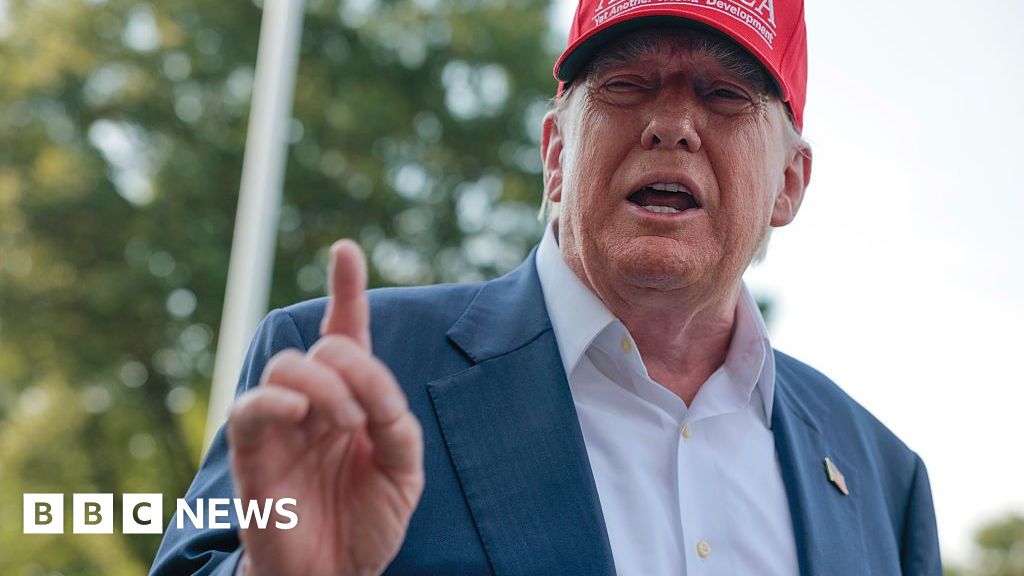President Donald Trump said on Wednesday that the US will charge 20% tariffs on imports from Vietnam under a new trade deal reached during last-minute negotiations. Products sent from Vietnam to the US had faced a 46% levy, which was set to go into effect next week as part of Trump's so-called "reciprocal" tariffs he announced in April. Dozens of other economies, including the European Union and Japan, are still scrambling to make their own deals with the US before the planned increases. Under the agreement, Vietnam will charge no tariffs on US products, Trump said in a social media post. Tariffs, which are a tax on imports, are almost always paid by the company that is buying the goods rather than the business which makes the product. While importers can decide to absorb the extra charge, they often choose to pass it on to the consumer. In the "Great Deal of Cooperation", as Trump called it, the US will also impose a steeper tariff of 40% on goods that pass through Vietnam in a process known as "trans-shipping". Peter Navarro, Trump's senior counsellor on trade and manufacturing, has claimed that a third of all Vietnamese exports to the US were actually Chinese products shipped through Vietnam. The president said on social media: "Vietnam will do something that they have never done before, give the United States of America TOTAL ACCESS to their Markets for Trade. "In other words, they will 'OPEN THEIR MARKET TO THE UNITED STATES,' meaning that we will be able to sell our product into Vietnam at ZERO Tariff." Vietnam has become a major manufacturing hub for a number of major brands such as Nike, Apple, the Gap and Lululemon. It was a beneficiary of firms moving factories out of China to avoid the tariffs Trump announced during his first term in office. Share prices of companies making goods in Vietnam initially rose although those gains were trimmed after it emerged products will face a 20% tax. Trump and Vietnam's General Secretary To Lam held a phone call on Wednesday, during which he reiterated an invitation for the US president to visit the country. Separately, the Trump family has recently announced projects in Vietnam. The country's government approved a plan by the Trump Organization and local business Kinh Bac City Development to invest $1.5bn in hotels, golf courses and luxury real estate. The Trump Organization is also scouting for locations to build a Trump Tower in Ho Chi Minh City. Trump initially imposed steep levies on trading partners around the world in April , citing a lack of "reciprocity", but then announced a pause where they were all lowered to 10%. Many countries then approached the US to negotiate trade deals, according to the White House. Since April, Washington had so far only announced a pact with Britain and a deal to temporarily lower retaliatory duties with China.
Trump announces trade deal with Vietnam
TruthLens AI Suggested Headline:
"Trump Unveils New Trade Agreement with Vietnam, Establishing Tariffs on Imports"
TruthLens AI Summary
President Donald Trump announced a new trade agreement with Vietnam that will implement a 20% tariff on imports from the Southeast Asian nation. This new tariff replaces a previously planned 46% levy that was set to take effect next week as part of Trump's broader strategy of imposing reciprocal tariffs on trading partners. The agreement is seen as a significant step in US-Vietnam trade relations, with Trump stating that under this deal, Vietnam will not impose tariffs on US products, thereby granting American businesses greater access to Vietnamese markets. This shift is intended to encourage trade and investment, particularly as Vietnam has emerged as a manufacturing hub for major global brands such as Nike and Apple, especially as companies relocate from China to mitigate the impact of tariffs enforced during Trump's first term.
In addition to the 20% tariff on imports, the agreement includes a steeper 40% tariff on goods that are trans-shipped through Vietnam, a move aimed at curbing the practice where Chinese products are routed through Vietnam to bypass US tariffs. Trump's senior trade advisor, Peter Navarro, has indicated that a significant portion of Vietnamese exports to the US may actually consist of Chinese goods. The announcement follows a phone call between Trump and Vietnamese General Secretary To Lam, during which Trump extended an invitation for a visit to Vietnam. Furthermore, the Trump Organization has plans to invest in Vietnam, including a $1.5 billion development project in hotels and luxury real estate, further solidifying the economic ties between the two nations. This agreement comes amid ongoing global negotiations as countries seek to establish favorable trade terms with the United States before more tariff increases are implemented.
TruthLens AI Analysis
You need to be a member to generate the AI analysis for this article.
Log In to Generate AnalysisNot a member yet? Register for free.
